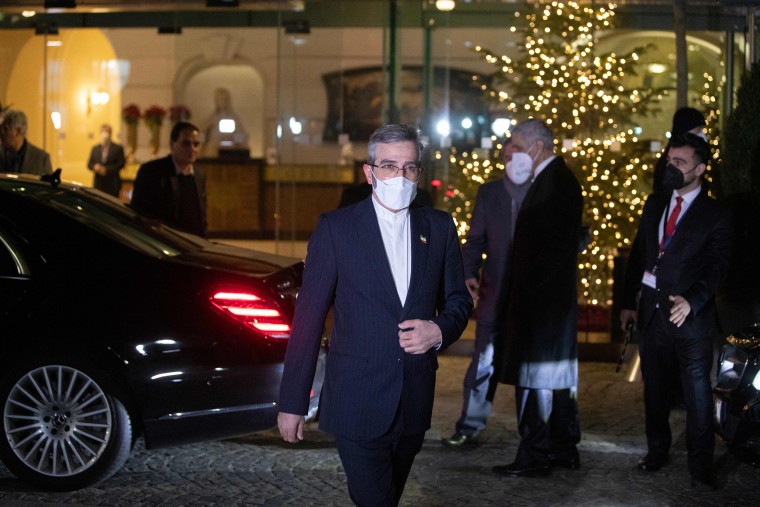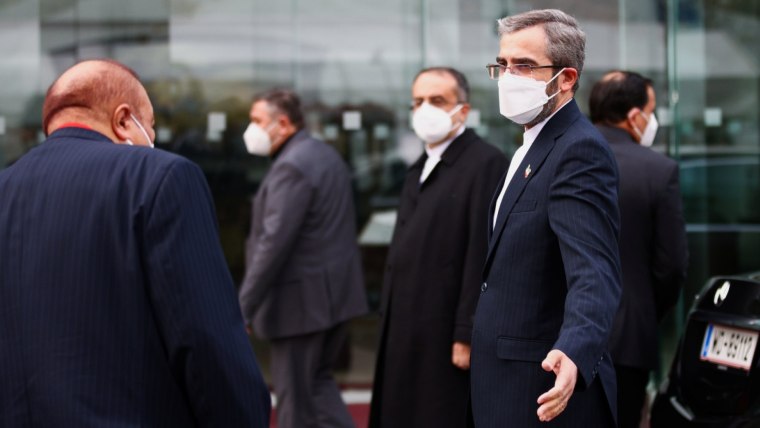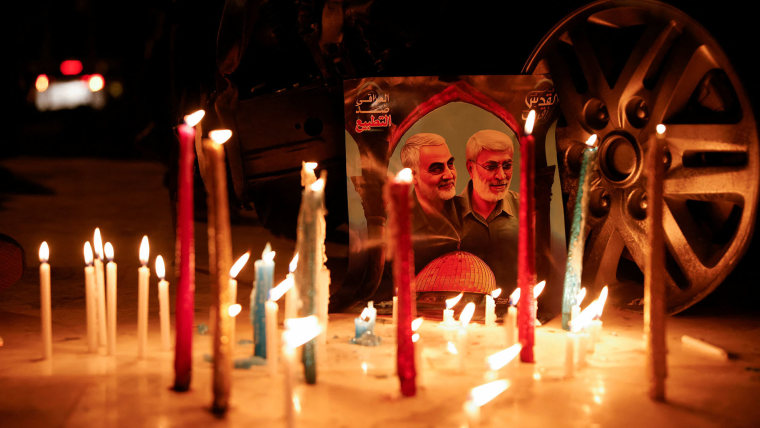
Time for Iran to make ‘tough decisions’ on whether to revive 2015 nuclear deal, says U.S. official
Asked how much time it would take Iran to secure enough fissile material for a nuclear weapon, the official said, “We’re talking about weeks, not months.”
Feb. 1, 2022, 2:31 AM MST / Updated Feb. 1, 2022, 7:45 AM MST
Nuclear talks between world powers and Iran are entering the “final stretch” and leaders in Tehran must now make tough political decisions about whether to return to the 2015 nuclear deal, a senior State Department official said Monday.
After the latest round of talks in Vienna produced progress, the negotiations have reached a critical stage, and Iran and other governments should decide whether to press ahead to clinch an agreement, the official told reporters.
The U.S., Britain, France, Germany, China and Russia, which are taking part in the negotiations, “are united on this notion that we have little time, that tough decisions need to be made and now’s the time to make them,” the senior State Department official said.

“This is the message that our European partners in particular left the Iranian delegation in Vienna with last Friday,” the official said.
The U.S. official said the Biden administration had the understanding that French President Emmanuel Macron conveyed a similar message when he spoke to Iranian President Ebrahim Raisi over the weekend. “That there is an opportunity, that it is a significant opportunity, but there’s also urgency, and if we all don’t move with that urgency, that opportunity will very soon disappear,” the official said.
The 2015 nuclear deal, known as the Joint Comprehensive Plan of Action, or JCPOA, imposed restrictions on Iran’s nuclear program in return for an easing of economic sanctions. But President Donald Trump pulled the U.S. out of the accord in 2018 and reimposed sanctions. Iran has since then steadily exceeded the deal’s limits on its nuclear activity, raising concerns that it could soon have enough fissile material for an atomic bomb.
Iran denies it has any plans to build nuclear weapons.
Iran’s growing stockpile of enriched uranium means time is running out to strike a deal, the senior official said.

“We are in the final stretch, because, as we’ve said now for some time, this can’t go on forever because of Iran’s nuclear advances,” the official said. It is not an “ultimatum, but just a statement of fact,” the official added.
It would take more time for Iran to build a nuclear warhead to be placed on the tip of a missile and to test a nuclear weapon, possibly months or more than a year, arms control experts say.
A revival of the 2015 nuclear deal would require Iran to get rid of much of its stockpile of enriched uranium, but it has gained technical know-how that cannot be erased, foreign diplomats said.
The 2015 deal had extended Iran’s breakout time to one year, but it is almost certain that if Iran returns to the accord, the time it would take to acquire enough fissile material for a bomb would be less than a year, the foreign diplomats said. A seal bearing the initials of the International Atomic Energy Agency at the nuclear research center of Natanz in Tehran, Iran in January 2014.Kazem Ghane / IRNA/AFP via Getty Images file
“It’s impossible now to go back to one year because of what they now know,” a diplomat said.
The senior State Department official said the negotiations in Vienna over the past month “were among the most intensive that we’ve had to date.”
The official added that “we made progress narrowing down the list of differences to just key priorities on all sides,” adding, “And that’s why now is the time for political decisions.”
The U.S. official also addressed questions about why some members of the U.S. negotiating team, including Richard Nephew, had left to take up other roles at the State Department just as the talks enter a crucial stage.
The official said that Nephew was “an exceptional colleague” and that it was “with regret that we see him moving on” but that it was not unusual one year into a new administration.
There were no “personal differences” in the negotiating team, and much of the media reporting was “simply misinformed,” the official said.
The policy for the nuclear talks is set by the president, the secretary of state, the national security adviser and others in the Cabinet, and the negotiating team carries out that policy, the State Department official said.
However, a different U.S. official and a person with knowledge of the matter said Nephew and another member of the team, Ariane Tabatabai, left over policy disagreements with the head of the negotiating team, Robert Malley. The two supported censuring Iran over its lack of cooperation with the U.N. atomic watchdog, the International Atomic Energy Agency, and opposed some proposed sanctions relief for Tehran, the sources said.
Nephew, Tabatabai and Malley declined to comment.
NBC News first reported Nephew’s departure from the team to another position at the State Department. The Wall Street Journal reported that Tabatabai had also left and why she and Nephew had departed.

The senior U.S. official said the release of four Americans imprisoned in Iran remained an “absolute priority” and that Washington continued to raise their plight in separate negotiations with Iran.
Human rights groups say the Americans have been detained on baseless charges and that Iran often jails foreign citizens to use as bargaining chips with Western governments. Iran denies the accusations.
Echoing recent comments by the Biden administration, the official said it was hard to imagine the U.S. returning to the JCPOA if the four Americans remained behind bars.
Iran has refused to hold direct talks with the U.S. delegation, and U.S. officials have to relay messages to the Iranians through other foreign diplomats at the talks.
The senior State Department official said the U.S. remains ready to engage in direct talks if Iran agrees.
“We’re prepared to meet with Iran if they’re prepared to meet with us,” the official said. “We have no indication that’s going to be the case when we reconvene.”
Iran’s U.N. mission did not immediately respond to a request for comment.
No comments:
Post a Comment